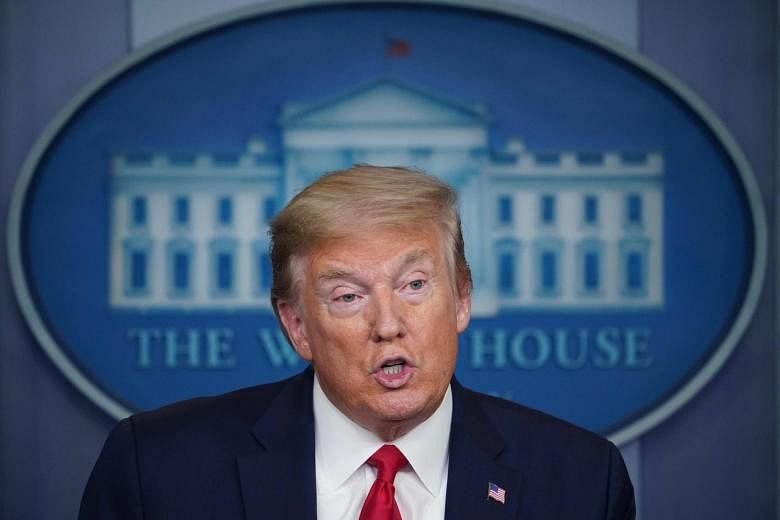WASHINGTON (NYTIMES) - President Donald Trump signed an executive order on Wednesday (April 22) temporarily blocking the issuance of green cards to those outside the United States, but the measure includes numerous exemptions, like for overseas spouses and young children of American citizens.
The order, which will be in place for at least 60 days, will affect thousands of parents, adult children and siblings of citizens seeking to immigrate to the United States.
Under the measure, a diversity visa lottery that issues about 50,000 visas each year will be suspended, and green card holders in the United States will be prevented from reuniting with their spouses abroad.
But it does not apply to immigrants already in the United States, nor to those seeking temporary visas, including students or guest workers like farmers.
Other exceptions include healthcare professionals and their families as well as people in the EB-5 programme, who invest hundreds of thousands of dollars in programmes that create jobs.
Also exempt from the order are members of the military and their children, as well as Iraqis and those from Afghanistan who obtain a visa by assisting military operations.
The policy could, however, be expanded; Mr Trump's top Cabinet officials will convene in at least 30 days to review any restrictions on "non-immigrant visas", including visas for seasonal workers.
While the President often rails against illegal immigration and promotes the construction of a wall along the southwestern border, the order is focused on the family-based immigration he and his allies have frequently assailed as "chain-based migration".
"It would be wrong and unjust for Americans laid off by the virus to be replaced with new immigrant labour flown in from abroad," Mr Trump said on Tuesday.
"We must first take care of the American worker."
But as the pandemic touches every corner of daily life, including the economy, few employers are reaching out for workers at home or abroad.
And critics have emphasised research that shows immigrants have a positive effect on the economy.
Immigrants and their potential employers are also already subject to a certification process to ensure that there are an insufficient number of American workers to fill any potential job.
"He's saying the system, the labour protections existing in the statute right now, are not good enough," said Ms Theresa Cardinal Brown, the director of immigration and cross border policy at the Bipartisan Policy Centre.
The executive order "means families will be separated, employers who have spent a lot of money and a lot of time to say, 'This is the person I need for my company,' will not have that person, and I can imagine they will not take kindly to this," Ms Brown said.
Mr Trump said this week he would impose a more sweeping order, saying he intended to close the United States to people trying to immigrate to the country to live and work.
But under intense pressure from business groups, he backed off barring guest workers for technology companies, farms as well as other employers.
Still, some business groups said they were frustrated by the move.
"Given the unprecedented economic turmoil caused by the Covid-19 health crisis, it is especially important now to welcome the world's top innovators and job creators, not send them home," said Mr John Neuffer, the chief of the Semiconductor Industry Association, a trade group.
More than one million immigrants were granted green cards in the 2019 fiscal year, and about half of them - 458,556 - were overseas.
Many of those visas went to the spouses and children of citizens.
Mr Trump's initial announcement, issued on Twitter late on Monday night, that he intended to "suspend immigration" surprised many of his top officials in the departments of Homeland Security and Defence.
The administration had already used authorities granted to Mr Trump's top health officials to effectively seal the southern border, and halt refugee flights and naturalisation ceremonies.
The State Department had suspended visa services last month at US embassies and consulates, but immigrants were still able to take procedural steps to come to the United States.
Hours before Trump signed the order, Ms Kellyanne Conway, his top adviser, said lawyers were still completing the policy.
The executive order seemed to acknowledge there might be issues with the ban's enactment, noting that if any provisions were "held to be invalid because of the lack of certain procedural requirements", the relevant agency should subsequently fulfil those requirements.
Mr Trump has said that he may extend the policy after 60 days "based on economic conditions at the time".
Ms Krish O'Mara Vignarajah, the president and chief of Lutheran Immigration and Refugee Service, said that "economically speaking, the thinking behind this order plays into the patently flawed idea that American prosperity is a zero-sum game".
"To the contrary, we see consistently that immigrants are essential, entrepreneurial, taxpaying and job-creating members of society" she said.











